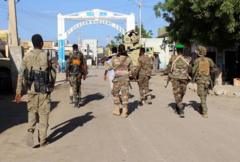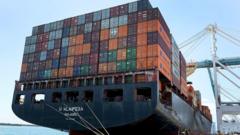Amid escalating U.S.-China tensions, Somaliland is positioning itself for potential statehood by negotiating a deal to lease its strategic Berbera Port to the U.S.
**Somaliland Seeks Statehood by Leveraging Strategic Ports Amid U.S.-China Tensions**

**Somaliland Seeks Statehood by Leveraging Strategic Ports Amid U.S.-China Tensions**
Somaliland aims for international recognition through U.S. port leasing deal as regional stability remains a concern.
In the quest for statehood, Somaliland, a self-declared independent region since 1991, has turned to the U.S. for recognition. Seeking to leverage its strategic position and established governance, officials in Somaliland are advocating for a proposal where the United States would lease their vital Berbera Port and its adjoining airstrip in return for endorsing their long-awaited statehood. This initiative has been formed in the backdrop of rising tensions between the U.S. and China, prompting Somaliland to explore its geopolitical interests.
Boasting its own currency, passport, and successful elections, Somaliland has aimed to highlight its stability in a region often marred by turmoil. Regional analysts caution, however, that recognizing Somaliland could have complex implications, including potential destabilization, the strengthening of militant groups like Al Shabab, and strained relations with neighboring countries who fear a ripple effect of secessionist movements.
The timing of this endeavor aligns with the U.S.'s concern over security issues in Somalia, particularly the threat posed by Houthi rebel activities disrupting shipping routes. There are speculations on the future of the U.S. embassy in Mogadishu, with potential closures under discussion. Consequently, establishing a stronghold in Somaliland could serve as a strategic countermeasure against increasing Chinese influence in the region.
As discussions move forward, Somaliland’s aspirations hinge not just on its unique regional position but also on the delicate balance within international relations and the broader impact it may have on the Horn of Africa.
Boasting its own currency, passport, and successful elections, Somaliland has aimed to highlight its stability in a region often marred by turmoil. Regional analysts caution, however, that recognizing Somaliland could have complex implications, including potential destabilization, the strengthening of militant groups like Al Shabab, and strained relations with neighboring countries who fear a ripple effect of secessionist movements.
The timing of this endeavor aligns with the U.S.'s concern over security issues in Somalia, particularly the threat posed by Houthi rebel activities disrupting shipping routes. There are speculations on the future of the U.S. embassy in Mogadishu, with potential closures under discussion. Consequently, establishing a stronghold in Somaliland could serve as a strategic countermeasure against increasing Chinese influence in the region.
As discussions move forward, Somaliland’s aspirations hinge not just on its unique regional position but also on the delicate balance within international relations and the broader impact it may have on the Horn of Africa.





















